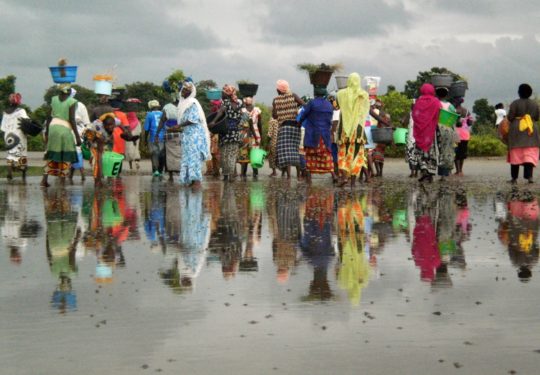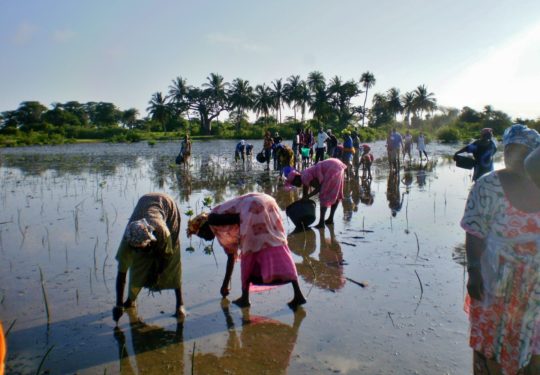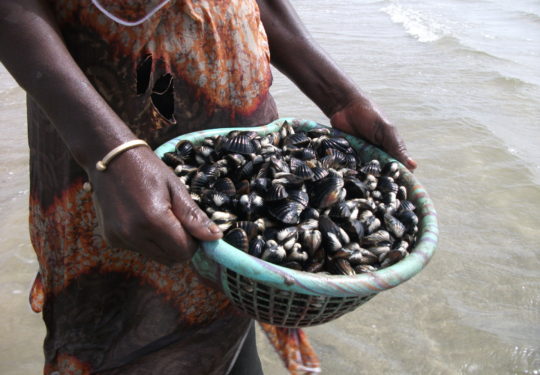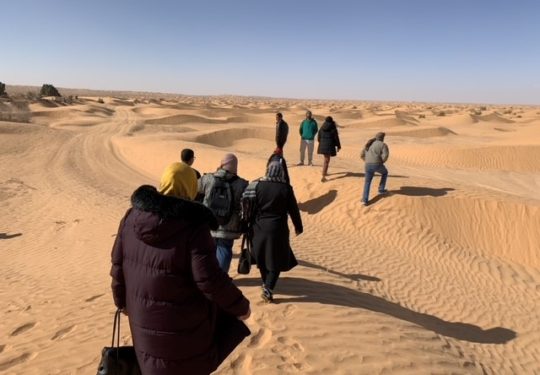International cooperation
A Cegep with global horizons
Since 1988, the Cégep de la Gaspésie et des Îles has been involved in international cooperation projects with several countries, including Senegal, Morocco, Tunisia, the Republic of Guinea, Gambia, Mauritania, Brazil, Haiti and Guinea-Bissau.
Primarily cooperating in the fields of educational engineering, technology transfer and community intervention, the Cégep works closely with a number of partners and local communities, to ensure seamless development with the greatest benefits.
Discover international cooperation on video
Adaptation of Coastal Populations and Blue Economy (APOCEB)
In 2019, the Cégep de la Gaspésie et des Îles received $7.3 million in funding from the Government of Canada, via Global Affairs Canada, to finance the Adaptation of Coastal Populations and Blue Economy (APOCEB) project.
The APOCEB project was designed to improve the management and exploitation of natural resources in five areas of intervention across four West African countries (Gambia, Guinea-Bissau, Senegal and the Republic of Guinea) in the context of climate change. Numerous development objectives are being pursued, including the elaboration of sustainable natural resource exploitation plans, the installation of processing units managed by inclusive community committees, as well as the diversification of economic activities through a circular economy model.
APOCEB also represents an international cooperation project promoting gender equality, the rights of the most vulnerable populations and the involvement of youth.
This project relies on the collaboration of local partners and the sharing of expertise and know-how with:
- in Senegal: the Dakar University Institute of Fisheries and Aquaculture (IUPA).
- in Gambia: the Ministry of Parks and Wildlife Management (DPWM).
- in Guinea-Bissau: the Institute of Biodiversity and Protected Areas (IBAP).
- in the Republic of Guinea: the Centre national des sciences halieutiques de Boussoura (CNSHB).
Women's governance and innovation (GEFI)
Women’s Governance and Innovation (GEFI) represents an economic, social and environmental development project for the communities of Niodior, Dionewar and Falia, in Senegal’s Saloum delta. It was launched in 2019 with $2 million in funding from the Government of Canada via Global Affairs Canada. The project focuses on improving women’s governance in the management and processing of agri-food products in the context of climate change. Activities under the GEFI project include improving the management and profitability of processing units, diversifying economic activities through a “circular economy” model, and fostering entrepreneurship among youth.
Ongoing training, introduction to entrepreneurial management, the creation of inclusive and participative management committees, environmental awareness, as well as the construction of an aquaponics station and a B&B are just some of the activities being implemented as part of the project.
The project also benefits from financial support from the Senegal Vocational and Technical Training Fund, or 3 FTP, also a member of the UNESCO-UNEVOC network.
Rural oyster farming and adaptation (ORA)
In 2021, the Québec government granted $500,000 to the Cégep de la Gaspésie et des Îles to finance the rural oyster farming and adaptation (Ostréiculture rurale et adaptation, or ORA) project, an international climate cooperation initiative for the villages of Dionewar, Falia and Niodior in Senegal.
The ORA project aims to develop the oyster industry (mangrove oyster farming) in a natural environment, providing an alternative to declining fish stocks. This economic activity represents a concrete response to climate change for the Senegalese communities affected.
The project consists of two phases. The first, an experimental phase, involves numerous tests on spat collection and oyster farming. In the second, implementation phase, groups of young oyster farmers from the community are trained to assume responsibility for this new economic activity.
To find out more about the positive impact of this project, watch the video (in French).
Ecotourism in Tunisia
The Cégep de la Gaspésie et des Îles teamed up with the Cégep de Matane in partnership with two Tunisian institutes of technology for higher education (Instituts Supérieurs d’Études Technologiques, or ISET), namely: the ISET of Kef (North-West region) and the ISET of Kébili (South region). At the core of this project was the design and implementation of an ecotourism management program.
Conducted between early 2020 and September 2023, this partnership is part of the Education for Employment program ÉPE Al-Najah Tunisie. Orchestrated by Colleges and Institutes Canada and funded by Global Affairs Canada, this program supports the higher education and employability of Tunisian ISET graduates, particularly young women, living in the country’s most underprivileged regions.
Follow us on LinkedIn!
A LinkedIn page (in French) is dedicated exclusively to international cooperation at the Cégep de la Gaspésie et des Îles. Be sure to follow it to find out about our latest news, discover our innovative projects and get to know our local experts.





